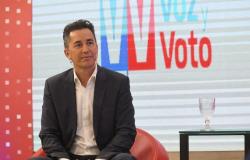
In the final part of his extensive speech at the inauguration of the “President Néstor Carlos Kirchner Microstadium” in Quilmes, in which he harshly criticized the orientation of the government of Javier Milei, The two-time president and once vice-president of the Nation, Cristina Fernández de Kirchner, took advantage of the reference to the massive march last Tuesday “in defense of the Public University”, to highlight that two of the most successful companies in the “technological” sector of Argentina: Mercado Libre and Globant benefited from policies and tax exemptions initiated during the government of Néstor Kirchner and, in addition, from the training of a good part of their professionals in public universities in Argentina.
Cristina praised the “wonderful mobilization of Argentine society” and said that she could not remember “such a large and transversal mobilization for the University in recent times.” She also recognized that it is necessary to rethink the tax system. “It’s true, there are too many taxes, it’s a mess, we have to simplify them,” she said.
He then addressed the issue of educational financing, mentioning that 88% of the universities’ budget is for the payment of teaching salaries, 6% for operating expenses and 1% for university hospitals, among other figures.
It was just an appetizer to enter Mercado Libre and Globant, although without mentioning its main owners and shareholders.
For this purpose, he exhibited a table in which, taking data from Mercado Libre’s presentations before the SEC, the US stock market regulator, he specified that in 2022 the company whose main reference is Marcos Galperinobtained a total of USD 79 million in tax advantages (that is, from the Argentine State) in 2022 and USD 103 million in 2023.
“With that,” he said, “it is enough for us to finance all the universities and all the (university) hospitals.”
Next, he specified that of the 12,958 employees that Mercado Libre has in Argentina, 59% are graduates of public universities. And that in the case of Globant, of Mercado Libre’s employees with a university degree are graduates of national universities and that in the case of Globant, of the 5,821 employees it has in Argentina, the proportion of graduates in public employees rises to 71 percent.
Cristina recalled that the government of Nestor Kirchner He was the one who instituted the first regime of tax benefits and Income Tax for the “knowledge economy” sector. She even said that she remembered it vividly, because as a senator she had attended an event of the Sector Chambers at the Hilton Hotel in Puerto Madero and that another of the beneficiaries of the regime was Globant.
“And it was good, because Globant was small, and we are proud,” he said, referring to the La Plata origin of its founders. Of the four, one (Guibert Englebienneis from Mar del Plata and studied in Tandil, and the rest (Martín Migoya, Martín Umaran and Néstor Nocetti) Yes, they are from La Plata and studied at the UNLP, in different technological careers.
“It was good to promote the kids,” he said of the tax benefits, “but they are companies that have reached the age of majority.” Therefore, he stated, it is time for them to “start giving back everything they have received.”
Galperin, who resides in Uruguay, is, as the British magazine The Economist highlighted in its latest edition, the richest person in Argentina and one of the richest in South America. His company is currently listed at USD 71.3 billion and in a region of 670 million inhabitants, in 2023 it would have 218 million active users who buy and sell products online and use Mercado Pago, the company’s payments arm.
“Galperin is the megastar of the Latin American technology scene. With a net worth of more than USD 6 billion, He is one of the richest men in the region. Already powerful in business, he is increasingly outspoken on social media,” said The Economist.
In fact, Mercado Libre’s main factotum actively supports the government and celebrates that Milei has become president to “get out of the decadence and poverty into which populism plunged us.” As Infobae reported at the time, already in the third quarter of 2023 Mercado Libre – which has been listed on Wall Street since 2007 – had reported that in the first nine months of 2023, it had received tax benefits for a total of USD 84 million
The promotion regime that CFK mentioned and Galperin’s company benefited from began with the old “Software Law” passed in 2004, during the Kirchner government, which had modifications until the current “Knowledge Economy Law.”
Mercado Libre itself detailed in its presentation to the SEC the tax benefits it receives, initially instituted by Kirchnerism
“Meli” itself (its “ticker” on Wall Street) described in its 2022 balance sheet that the benefits include reducing the Profit burden (60% for micro and small businesses, 40% for medium-sized companies and 20% for large companies). companies) on promoted activities, applicable to both Argentine and foreign source income; the stability of the benefits of the promotion regime; and a non-transferable tax credit bonus for an amount of 70% (which can reach 80%) of the social security contribution for employees who carry out the promoted activities, which can be used against VAT and, for some exporters, also for Profits.
It is still a paradox that Cristina Kirchner denounces a company for using the fiscal tools that Kirchnerism itself instituted. It is also striking that he considers that companies like Mercado Libre and Globant should already renounce these benefits and begin to “return everything they have received”, when at the same time they continue to support the industrial promotion regime of Tierra del Fuego, instituted in 1972, during the dictatorship of general Alejandro Agustín Lanussewhich survives through numerous modifications and which the government of Alberto Fernandezof which Cristina was vice president, extended until 2038, when the Fuegian regime, which had been conceived with the argument of “nascent industries” and to promote a greater population of the island, will turn 66 years old.





